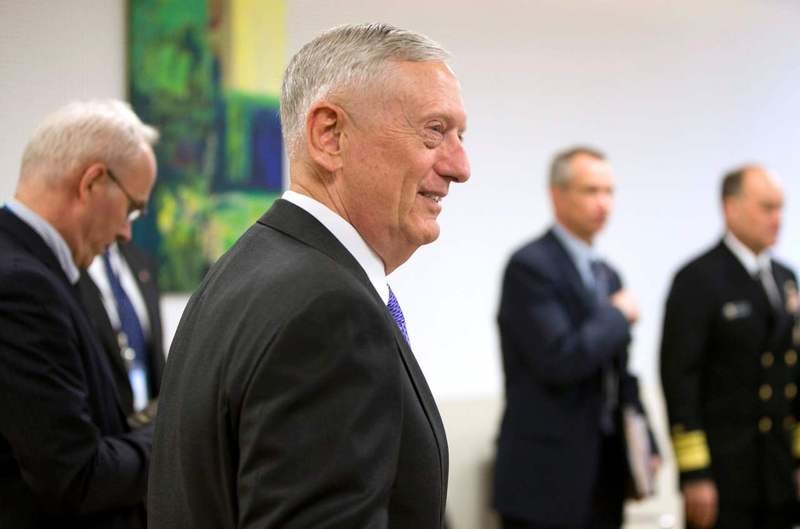hankyoreh
Links to other country sites 다른 나라 사이트 링크
James Mattis says US still not planning military action against North Korea

As tensions rise on the Korean Peninsula in the wake of an ICBM launch by North Korea, US Secretary of Defense James Mattis has stressed that current US policy towards the North remains committed to applying economic and diplomatic pressure instead of seeking a military solution.
“I do not think this capability [to launch an ICBM], in and of itself, brings us closer to war. The president’s been very clear, the secretary of state’s been very clear, that we are leading with diplomatic and economic efforts,” Mattis stated in a press interview on July 6. The sudden press conference has been interpreted as an attempt to quell speculation about a pre-emptive strike after Nikki Haley, US ambassador to the UN, mentioned the previous day that the US is prepared to use its "considerable military forces" to defend itself and its allies "if we must."
President Trump has also warned that the US will “publicly demonstrate to North Korea that there are consequences for their very very bad behaviour.” Mattis went on to say that US diplomacy towards North Korea has not failed, and acknowledged State Secretary Rex Tillerson as a key figure in resolving the North Korean issue. He mentioned the 2010 shelling of Yeonpyeong and South Korean Cheonan warship sinking, stressing that “our self-restraint holds, and diplomatic efforts remain underway.” These efforts include cooperation with US allies and China, as well as sanctions against North Korea.
“The military remains ready in accordance with our alliance with Japan, with [South] Korea,” Mattis said. “We stand ready to provide options if necessary.” However, he made it clear that the military option would only be exercised in response to a pre-emptive use of military force by the North, adding “any kind of effort by North Korea to start a war would lead to severe consequences.”
Despite the tough talk from Haley and President Trump, diplomatic sources believe that Trump’s policy towards North Korea has not changed. The military option remains a last resort, and a regime change or unification by absorption are still the administration’s favored options. However, at the same time the US is pulling out all stops to ramp up the pressure on North Korea, including seriously considering a ‘secondary boycott’ targeting Chinese banks and companies.
Many experts within the US still believe that, realistically, the country should seek a solution through diplomatic trade-offs, such as an agreement to freeze North Korea’s nuclear and missile program in exchange for adjustments to or the suspension of joint Korea-US military exercises. In a video conference, Joel Wit, the founder of 38 North, a North Korean affairs website, stated “The joint South Korea-US military program is not set in stone. It could be altered in a way that makes it less threatening to North Korea while also protecting our allies.” Wit was critical of concerns that the regime should not be rewarded for bad behavior. “The US has never rewarded North Korea’s bad behavior, which has led to the country developing ICBMs that are capable of attacking us,” he said.
By Yi Yong-in, Washington correspondent
Please direct questions or comments to [english@hani.co.kr]

Editorial・opinion
![[Column] The state is back — but is it in business? [Column] The state is back — but is it in business?](https://flexible.img.hani.co.kr/flexible/normal/500/300/imgdb/original/2024/0506/8217149564092725.jpg) [Column] The state is back — but is it in business?
[Column] The state is back — but is it in business?![[Column] Life on our Trisolaris [Column] Life on our Trisolaris](https://flexible.img.hani.co.kr/flexible/normal/500/300/imgdb/original/2024/0505/4817148682278544.jpg) [Column] Life on our Trisolaris
[Column] Life on our Trisolaris- [Editorial] Penalties for airing allegations against Korea’s first lady endanger free press
- [Editorial] Yoon must halt procurement of SM-3 interceptor missiles
- [Guest essay] Maybe Korea’s rapid population decline is an opportunity, not a crisis
- [Column] Can Yoon steer diplomacy with Russia, China back on track?
- [Column] Season 2 of special prosecutor probe may be coming to Korea soon
- [Column] Park Geun-hye déjà vu in Yoon Suk-yeol
- [Editorial] New weight of N. Korea’s nuclear threats makes dialogue all the more urgent
- [Guest essay] The real reason Korea’s new right wants to dub Rhee a founding father
Most viewed articles
- 1[Column] Why Korea’s hard right is fated to lose
- 260% of young Koreans see no need to have kids after marriage
- 3Amid US-China clash, Korea must remember its failures in the 19th century, advises scholar
- 4[Column] The state is back — but is it in business?
- 5Japan says it’s not pressuring Naver to sell Line, but Korean insiders say otherwise
- 6AI is catching up with humans at a ‘shocking’ rate
- 7S. Korean chaebols comprise 84% of GDP but only 10% of jobs
- 8Hybe-Ador dispute shines light on pervasive issues behind K-pop’s tidy facade
- 9[Column] Life on our Trisolaris
- 10[Reportage] New funeral culture taking hold in South Korea